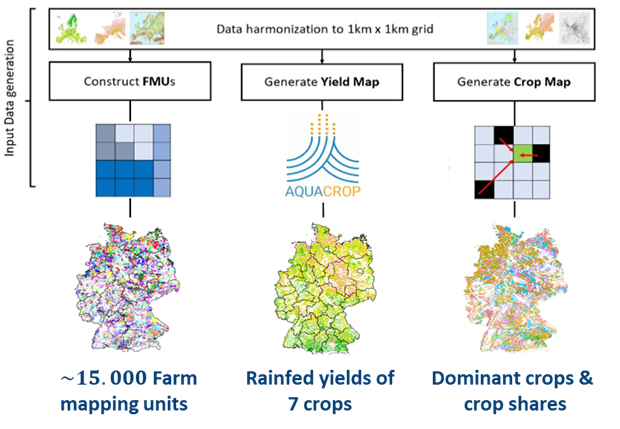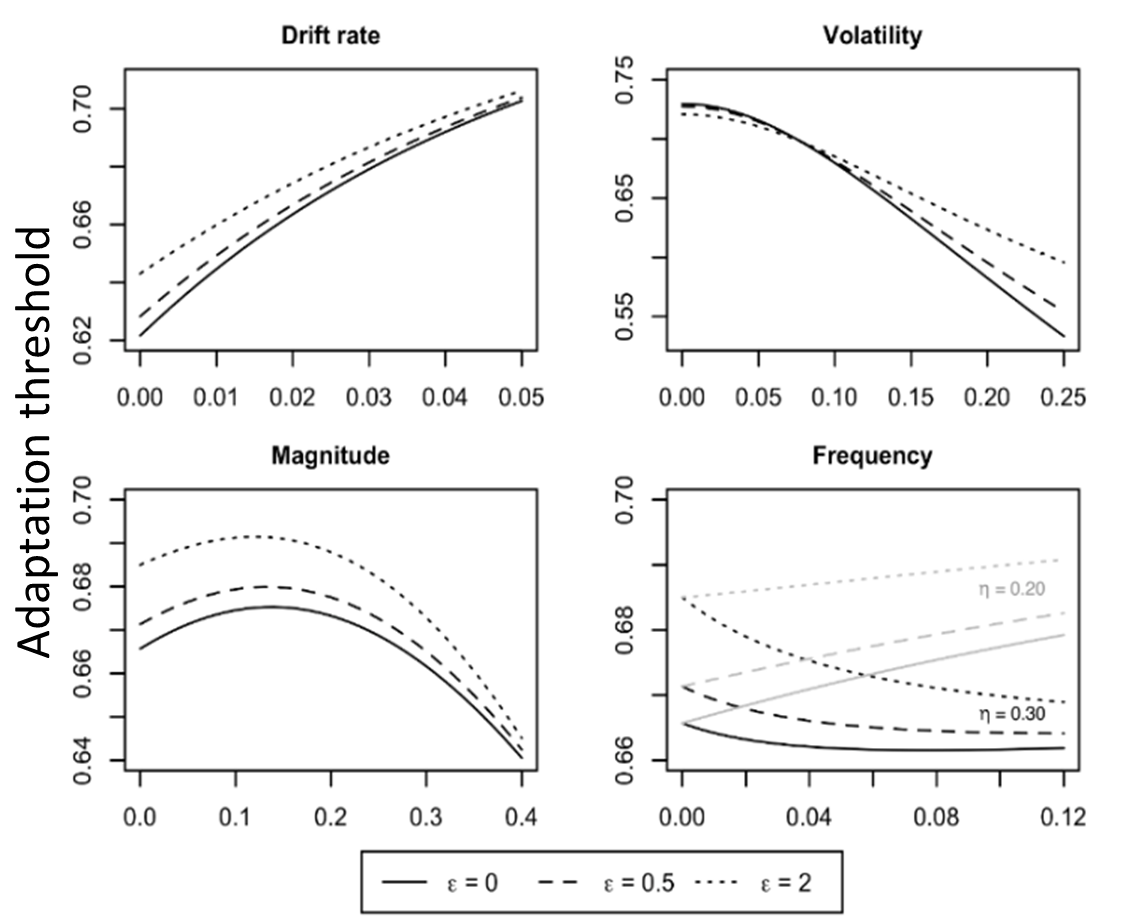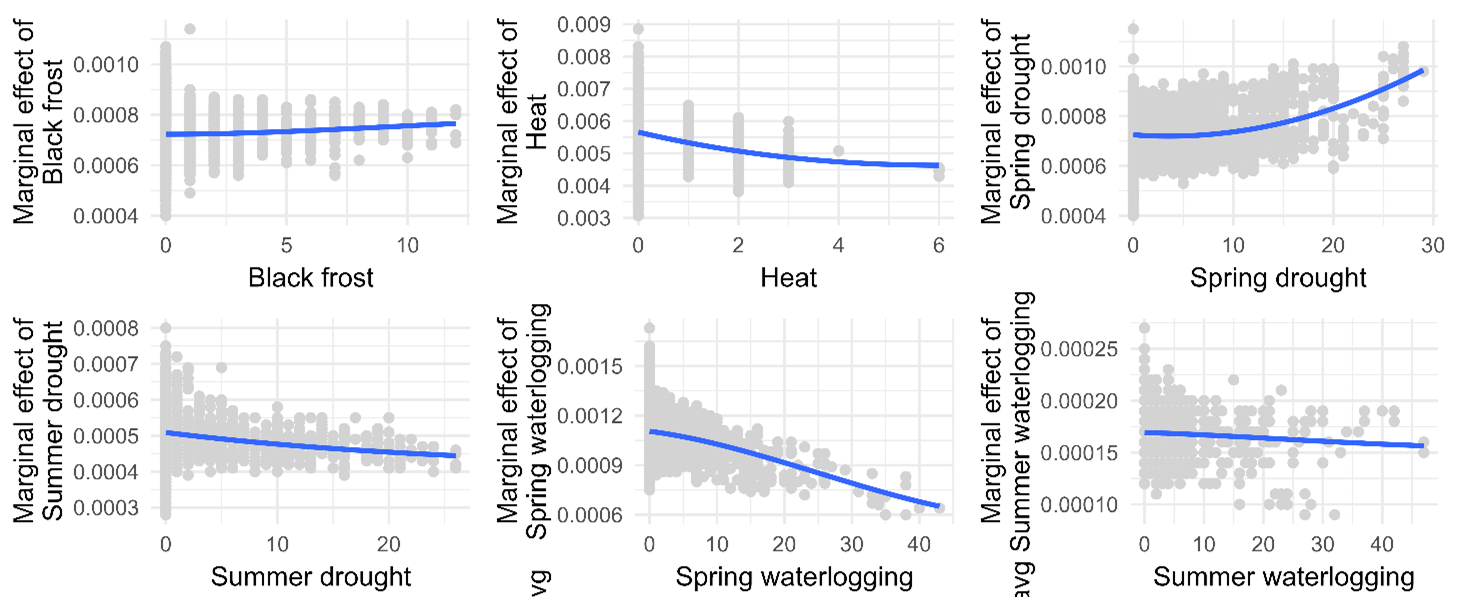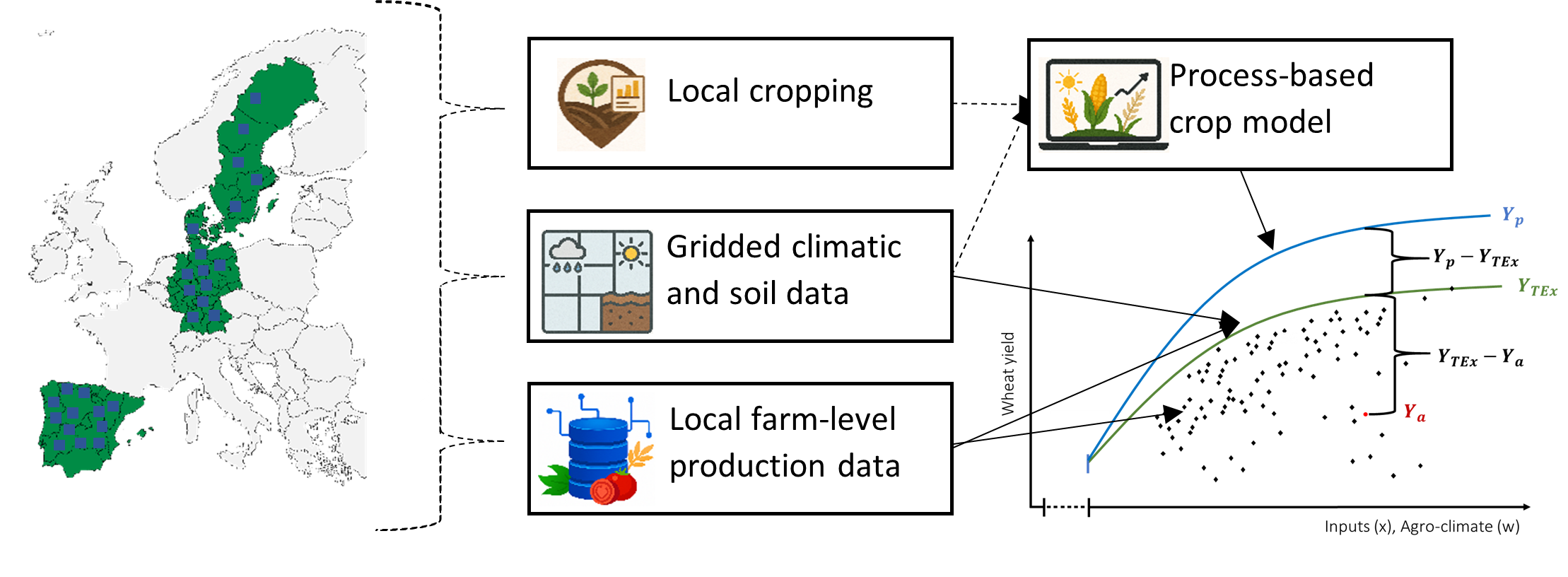A05
Representation of adaptation: the on-farm perspective
Prof. Dr. Silke Hüttel
University of Bonn | +49 551 39-24846 |
Prof. Dr. Michael Leyer
University of Marburg | +49 6421 28-23382 |
Dr. Stefan Seifert
University of Göttingen | +49 551 39-24841 |
Oliver Behn (PhD student)
University of Göttingen | +49 551 39-24264 |
Summary
In A05, we aim at an improved representation of how farmers adapt to climate change, altering weather (extremes), production risk and efficiency, and ultimately expectations on farming returns. Yet to date, farms seem reluctant to adapt their farming structure. Based on the real options approach, we hypothesize that this reluctance can be explained by farms’ investment behavior under risk and various sources of inefficiency. We test this hypothesis using observational data. To understand underlying cognitive decision processes under extreme hydrometeorological events, we test the impact of such perceived instances on farm adaptation decisions using an experimental approach.
Contribution to the CRC
This project contributes to the understanding of on-farm adaptation processes impacting LULCC. The improved representation of adaptation processes in form of adaptation probabilities and insights on regional LULCC dynamics generated in the partner project A06 will inform LULCC scenario development for earth system modelling in project D01.
Approach
We take the farm perspective and aim at an improved representation of how farmers in the CRC’s EU focus regions adapt to climate change. Climate change alters weather conditions, translating into changes in a farm’s risk profile and production efficiency, in turn influencing expectations on future farming returns. Farms react to these changes by adapting the farming structure, such as crop choice, irrigation expansion and adoption, or termination of farm branches, to better cope with changed risk profiles. However, despite observed trends of changing climatic conditions and thus farm risks, farmers seem reluctant to adapt.
As adaptations encompass partly irreversible investments or disinvestments subject to expectations about uncertain future returns, we hypothesize that this reluctance can be explained by farmers’ investment behavior under risk: under uncertain future returns from farming, costly reversible adaptations, flexible timing and production inefficiency, waiting for new information can be beneficial. Climate change, however, also implies a higher likelihood of extreme hydrometeorological events, which leads us to the hypothesis that adaptation behavior becomes more likely. We proceed as follows:
- To enrich farm accountancy data by detailed information on weather, climate, and geography, we develop a probabilistic approach to downscale farm data from NUTS-2 to NUTS-3 level. (WP0)
- Based on these farm observational data, we analyze gaps between economically optimal and realized farm output for given weather data and quantify production inefficiency. We decompose overall production inefficiency into managerial, policy-induced and perceived inefficiency due to weather risk. (WP1)
- We analyze farms’ adaptations under different sources of inefficiency and production relevant risk based on a real options model. (WP2)
- Using an experimental approach, we test relevance of instances from extreme hydrometeorological events for farm adaptation decisions. (WP3)
- The improved representation of adaptation processes in form of adaptation probabilities enter the scenarios in D01. (WP4)
Main results in 2022
Farm-level data for the analysis has been acquired. First results indicate that state-of-the art econometric methods and crop models can support the accuracy of the spatial probabilistic downscaling approach. A baseline model for farms’ adaptation decisions based on the real options approach shows that uncertainty and risk aversion affect adaptation thresholds and may explain farms’ reluctance to adapt to climate change.
Presentations 2022: DETECT Land and Climate Seminar; Ringvorlesung „Klimawandel Folgenabschätzung und Anpassungsstrategien für die Landwirtschaft“ at the Faculty of Agriculture in Bonn; EWEPA 2022 in Porto; FORLand Webinar (DFG FOR 2569)
Additional: HALLE grant with Emory University and Humboldt-Universität Berlin “Supporting Sustainable Agricultural Landscapes in the EU and US”; von Trott stipend for Moritz Hartig
Main results in 2023
In 2023, a primary focus of A05 was the assembly of data suitable for the research aims of the project. Due to the low spatial resolution of the data available from the EU Farm accountancy data network (FADN), a new work package “WP0” aims at improving the assignment of weather, climate, and geographical information to farm-level data. An extended replication of Kempen et al. (2011, https://doi.org/10.1016/j.agee.2010.08.001), summarized in Figure 1, combines geographical information (FMUs) with spatial crop choice information (crop map) and estimates of potential yields for the main crops obtained through crop growth modelling (yield maps).

Figure 1: Work flow of A05’s new work package WP0
The resulting increase in spatial resolution from NUTS-2 to NUTS-3 increases variability in climate and weather measures, as indicated in Figure 2. In cooperation with the Thünen Institute, we ran validation analyses using observed farm locations. Results underline an increased precision in the assignment of weather and climate variables.

Figure 2: ECDF of assigned precipitation for farm locations based on NUTS-2 level (red line) and NUTS-3 (blue line)
In work package WP2, we derived a theoretical model for adaptation investment decisions that extends the standard real options approach by jump processes induced by weather shocks and accounts for different levels of risk aversion. First simulation results suggest that risk averse farmers adapt generally earlier. Adaptation reluctance may, however, increase or decrease in downside shock exposure (see Figure 3).

Figure 3: Simulation results: Adaptation thresholds for different levels of risk aversion ( for different levels of climate change drift rates and volatility, and downside shock (climate extremes) magnitude and volatilities
Presentations:
Hartig, M., S. Seifert, J.-H. Haunert, S. Hüttel (2023): Improving Geographical Accuracy of Agricultural Data: A Probabilistic Spatial Downscaling Approach, annual GeWiSoLa conference
Seifert, S., Wolff, S., Hüttel, S. (2023): Eco-efficiency in the agricultural landscape of North Rhine-Westphalia, Germany” annual GeWiSoLa Conference, biannual EAAE congress, North American Productivity Workshop
Kodama, W., Hüttel, S., Börner, J. (2023): EAAE Congress organized session „Climate policy development: What is the contribution of Agicultural Economics?” with A06 and J. Kusche.
Main results in 2024
In WP1, we investigated the role of extreme events for crop farm efficiency with a focus on Germany. Results of the “new” WP0 entered the analysis to assign local extreme events where we account for temperature and precipitation-related extreme events. Using production function estimates explicitly accounting for the potential endogeneity of farms’ input choices, results underline the notable productivity- and efficiency-decreasing effects of climate extremes (compare Figure 4).

Figure 4: Marginal effects of agroclimatic extreme events on crop-farm efficiency (Hartig et al., 2024)
For WP2, we collaborated with Petra Friedrichs and Svenja Szemkus (D04) to calibrate a Real Options model to projections of climate extreme probabilities with a focus on droughts in the study region Austria. Results underline that, irrespective of the SSPs, climate trajectories indicate a higher frequency of extreme events that can trigger farm adaptation investments.
For WP3, a pre-test of the experiment investigating the role of perceived extreme events for farm adaptation decision was performed. The pre-test was conducted using students of agricultural sciences, and, thus, future farm managers, as participants in the experiment. Results suggest that participants prefer incremental adaptation strategies and that previous exposure to climate extreme events increases the likelihood of adopting adaptation measures.
Presentations:
Hartig, M., Hüttel, S., Seifert, S. (2024): Talking about the weather – Farm-level inefficiency and climate extremes. European Workshop on Efficiency and Productivity Analysis. Agriculture session in honor of Gudbrand Lien. Faro, Portugal, June 18-21,2024.
Publications:
Brill, F.; Alencar, P. H. L.; Zhang, H.; Boeing, F.; Hüttel, S.; Lakes, T. (2024) Exploring drought hazard, vulnerability, and related impacts on agriculture in Brandenburg. Natural Hazards and Earth System Sciences, 24(12): 4237–4265.
Leonhardt, H., E. Burchfield, … M. Ferro, S. Hüttel, S. Seifert (2024) Towards comparative analysis of agricultural land systems in the EU and US: Data and research agenda. Land Use Policy 147, 107371.
Leonhardt, H., Wesemeyer, M., Eder, A., Hüttel, S., Lakes, T., Schaak, H., Seifert, S., Wolff, S. (2024) Use cases and scientific potential of land use data from the EU’s Integrated Administration and Control System: A systematic mapping review. Ecological Indicators, 167: 112709.
Hüttel, S., Hess, S. (2024) Are lessons being learnt from the replication crisis or will the revolution devour its children? Open Q science from the editor's perspective. Q Open,qoae019.
Uehleke, R., Von Plettenberg, L., Leyer, M., Hüttel, S. (2024) German sugar beet farmers’ intention to use autonomous field robots for seeding and weeding. Journal of Environmental Management 370, 122472.
Seifert, S., Wolff, S., Hüttel, S. (2024) Eco-efficiency in the agricultural landscape of North Rhine-Westphalia, Germany. Agricultural Systems 220, 104062.
Preliminary results in 2025
In WP1, we collaborated with C02 to extend our statistical modelling. We use processed-based crop models to dissect wheat yield gaps, i.e., the difference between realized and potential yields, for European agriculture. The work flow is illustrated in Figure 5. Preliminary results show wheat yield gaps of up to 40%. We find climate extreme events, e.g., drought and waterlogging, are largely responsible for wheat yield gaps Other potential determinants of yield gaps, such as farm-management and policy, also shaped yield gaps but show minor contributions.

Figure 5: Process differentiating wheat yield gaps, the difference between realized and potential yields
In WP2, we investigate investments in irrigation in Denmark using FADN crop farm data. Preliminary results suggest that greater output price volatility (e.g., potato price volatility) and higher farm inefficiency are associated with a lower probability of farm irrigation investments. In contrast, weather shocks seem to trigger investments; for instance, irrigation investments increased especially after the severe summer drought 2010. Thus, preliminary results indicate counteracting effects of climate change with an increase in economic uncertainty leading to a delay in irrigation investments, whereas the occurrence of climate extremes may trigger such investments in the following period(s).
In WP3, we ran experiments on adaptation investments in response to climate extremes. The experiments were conducted with farmers from Germany. Preliminary results support the findings of our pre-test in 2024 and suggest that previous exposure to climate extreme events increases the likelihood of adopting adaptation measures. Additionally, the frequency and memory presence of past events, as well as prior adaptation responses, were associated with a higher likelihood of making transformative adaptation decisions. When faced with a new climate extreme event, participants’ past experiences shaped whether they perceived the situation as concerning, which subsequently heightened their perceived need for action and promoted more transformative adaptation.
Presentations:
Seifert, S., Britz, W., Heckelei, T., Hüttel, S., Kodama, W. (2025): Climate Extremes, Irrigation and Farms’ Adaptation to Climate Change: The Danish Case. XVIII EAAE Congress 2025, Bonn, Germany.
Behn, O., Kionka, M., Leyer, M., Hüttel, S., (2025): The impact of perceived climate extremes on farmer adaptation decisions to climate change. 34th European Conference on Operational Research Leeds, United Kingdom, 25.06.2025.
Behn, O., Kionka, M., Leyer, M., Hüttel, S. (2025): The impact of perceived climate extremes on future farmer adaptation decisions to climate change. 7th Annual Meeting of the Research Network on Economic Experiments for the Common Agricultural Policy (REECAP), Leipzig, Germany, 03.06.2025.
Hartig, M., Seifert, S., Behrend, D., Gaiser, T., Hüttel, S. (2025): Assessing European wheat yield gaps. XVIII EAAE Congress 2025, Bonn, Germany.
Publications:
Hüttel, S., Hess, S. (2025): Are lessons being learnt from the replication crisis or will the revolution devour its children? Open Q science from the editor's perspective, Q Open 5(3), qoae019.
Hüttel, S., Hermann, D., and Vielhauer, J. (2025): Carbon emission reduction in arable farming: Farmer crop portfolio responses to varying carbon credit pricing scenarios, EGU25-7122, Vienna, Austria.

